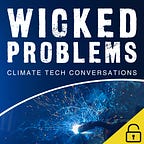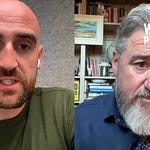We think this episode is a set of great chats and clips that’s worth your time in this week of devastating disasters in the US. But indulge me for a minute of soapbox mode.
<soapbox>
The time for caution is over. As previously unthinkable storm after previously unthinkable storm leaves cities and communities devastated and increasingly uninsurable, it’s clearer than ever: the fight against climate change isn’t just a scientific or policy debate about the future — it’s a battle for justice for things that are already happening.
And in the case of Hurricane Helene, which ravaged the inland mountain hollers of North Carolina and the much of America’s southeast with unprecedented force, that battle must now go to the courts. Richard Wiles of the Center for Climate Integrity argues in our conversation that North Carolina should sue the oil majors for damages caused by this superstorm. It’s long past time to admit that what we’ve been doing so far hasn’t been working, and that behaviour change from those profiting from emissions isn’t going to happen without a radically different approach.
Continuing as we are simply plays into the hands of people who have hard-pivoted from “climate change isn’t a big deal” to “the government is controlling the weather to destroy communities and dig for lithium”. As Wiles says, litigation is one of the few tools left to try and shake people out of their unreality bubble and into a shared set of facts agreed to by a jury of ordinary folk.
And for North Carolina to win—not just in court but in the court of public opinion—it’s time to stop dancing around the truth: we had a window to “keep 1.5 alive”, but the oil majors both knew they caused this and successfully delayed action for decades. Now it’s time to pay.
The science is clear. Hurricanes like Helene don’t just happen—they’re fuelled by decades of fossil fuel emissions. The storm’s rapid intensification, something once thought impossible, was driven by carbon emissions that have warmed our atmosphere and seas to catastrophic levels. Wiles didn’t mince words when we spoke:
“…hold this industry accountable and stop making people feel guilty because as if they did something, you know, grandma turning up the heat or driving in the store is not why we have climate change.
It's because industry knew and they lied and they're still lying about it and it's going to get worse unless we call them out. If there's no accountability, we'll never get to the solution. Accountability first. Then we can talk about what the solution is going to be.”
Wiles is right. And not only about the oil majors’ responsibility—he’s right about how North Carolina needs to act. The idea that Asheville, or any city, can recover from this level of devastation without holding the biggest carbon emitters accountable is absurd. If the oil majors are responsible for heating the oceans and intensifying storms like Helene, they must be held accountable for the damage done. But getting there requires more than just filing a lawsuit—it requires a massive pivot in how we talk about climate change, one that cuts through the noise of conspiracy theories and political obstruction.
This is where the fight gets tricky. As Milton and Helene bore down, you had people like Marjorie Taylor Greene promoting the idea that these storms were somehow government-engineered to punish Trump voters. Batshit crazy? Yes. But it taps into something real—people’s justified fear and anger about increasingly unpredictable and destructive weather. These storms are terrifying, and in the absence of clear, direct assignment of responsibility that is now established to a legally acceptable standard by efforts like Dr. Fredi Otto’s World Weather Attribution project, fear breeds conspiracy. This is why the cautious language around the 1.5°C climate target has become more than just academic—it’s actively harmful. The longer we hedge on acknowledging we’ve been pushed over that threshold - which makes solutions more urgent to prevent it getting even worse, the more room we leave for bad actors to hijack the conversation.
Joe Lo of Climate Home News made an important observation during our conversation. He pointed out that the ambiguity surrounding 1.5°C has created a vacuum, one filled by those who want us to abandon climate action altogether. “When we say 1.5°C is slipping away, we’re implying that people’s homes, their lives, their futures are gone,” Lo said. Which is why he and so many others are extremely reluctant to say that line of defence has fallen.
But leaving that unsaid allows people who want to delay action, or profit from it, to fill the gap with narratives about why we should just adapt and move on.
This is why North Carolina’s lawsuit is so crucial—it’s not just about legal accountability, but about shifting the entire narrative. We need to make it clear that climate change isn’t some abstract threat looming in the distant future—it’s here, it’s happening now, and we know exactly who is to blame. The oil majors, who for decades lobbied to delay action on carbon emissions, are responsible for making storms like Helene possible. If we don’t say that explicitly, and if we don’t shift from a defensive stance on 1.5°C to actively holding to account the biggest emitters, we will lose this fight. And worse, we’ll leave vulnerable people even more susceptible to the worst actors and conspiracy theories.
The stakes are high, and the alternative is grim. We continue to hem and haw about whether it’s better to say that 1.5°C is "slipping away" or already dead - as (shockingly and instantly virally) attributed to IPCC head Jim Skea by the Telegraph with a Jonathan Leake byline - without naming the culprits, we will be outflanked by those who want nothing more than to delay climate action and preserve their profits. Look at what’s already happening: companies like Saudi Aramco are raising billions in bonds maturing in 2064—an implicit bet that the world will keep burning fossil fuels long after we’ve passed 1.5°C. As Mark Campanale of Carbon Tracker pointed out during a panel event this week moderated by friend-of-the-show Prashant Rao: “I mean, what are we doing?”
If we don’t pivot now—if we don’t make a direct, aggressive case against the oil majors—not just in court but in every public forum, we risk losing everything. North Carolina should lead by example, filing a lawsuit that holds Big Oil accountable not just for Helene, but for every future hurricane, flood, or wildfire they’ve made worse. And it’s not too late in this US presidential campaign for Kamala Harris to endorse that – both tactically because it will dominate the conversation but strategically it moves the conversation to more favourable territory for the remaining 3 weeks of the campaign.
It’s time to stop being cautious about the 1.5°C target. If we’re going to fight for our future—and the future of everyone in the path of the next superstorm—then we need to be clear: we may have lost the 1.5°C battle, but we can still win the war against those who caused it. And we start by making the oil majors pay for the damage they’ve done, starting with North Carolina and Hurricane Helene. Anything less will fail.
</soapbox>
Links to some guests and things discussed in this episode:
Joe Lo at Climate Home News | BlueSky | Twitter
World Weather Attribution project
And if you’re enjoying our outro tunes, they’re all right here:

















